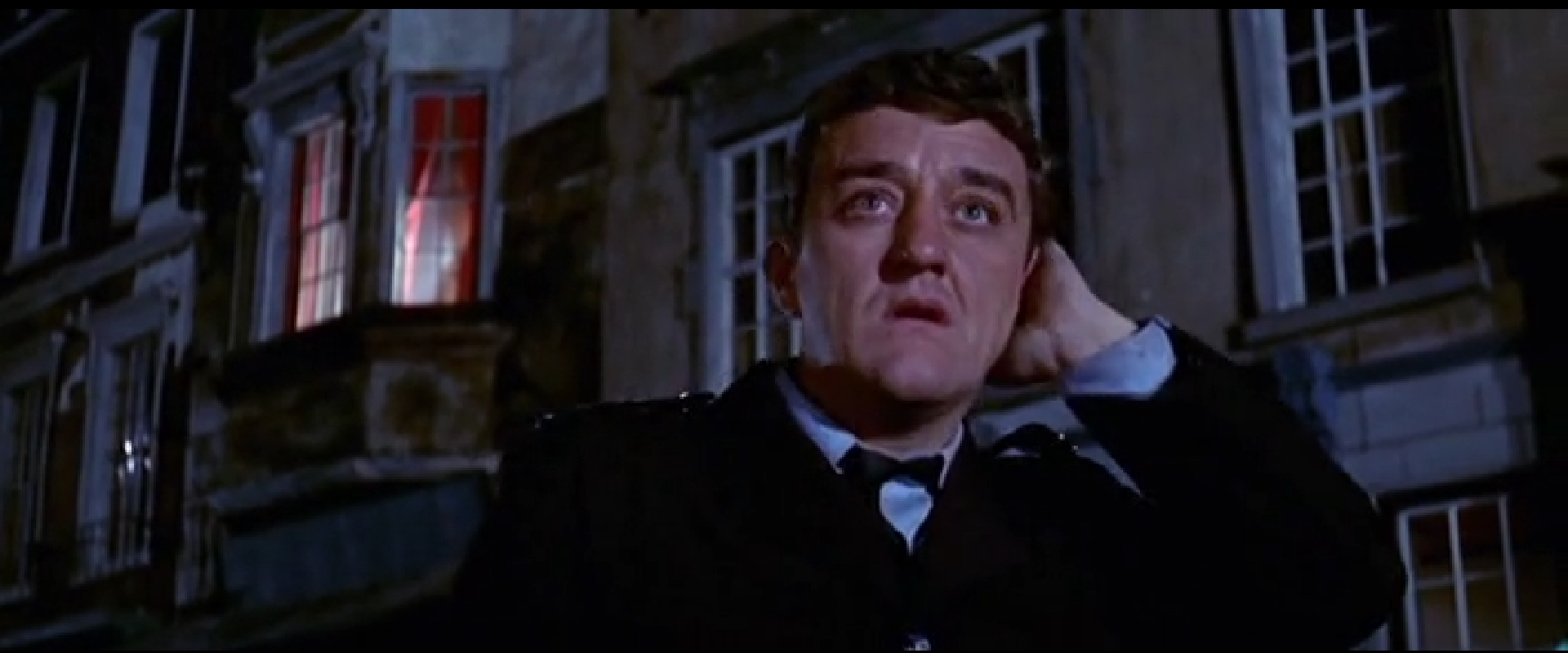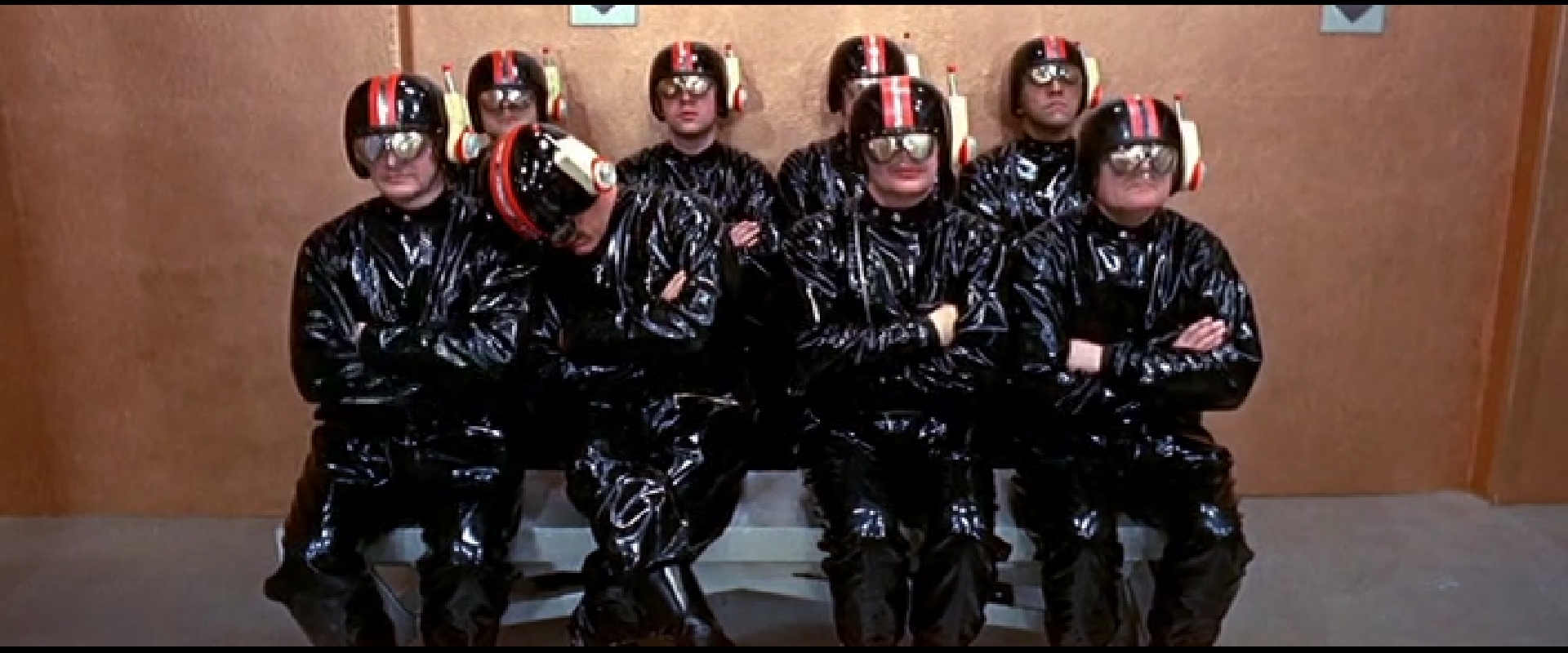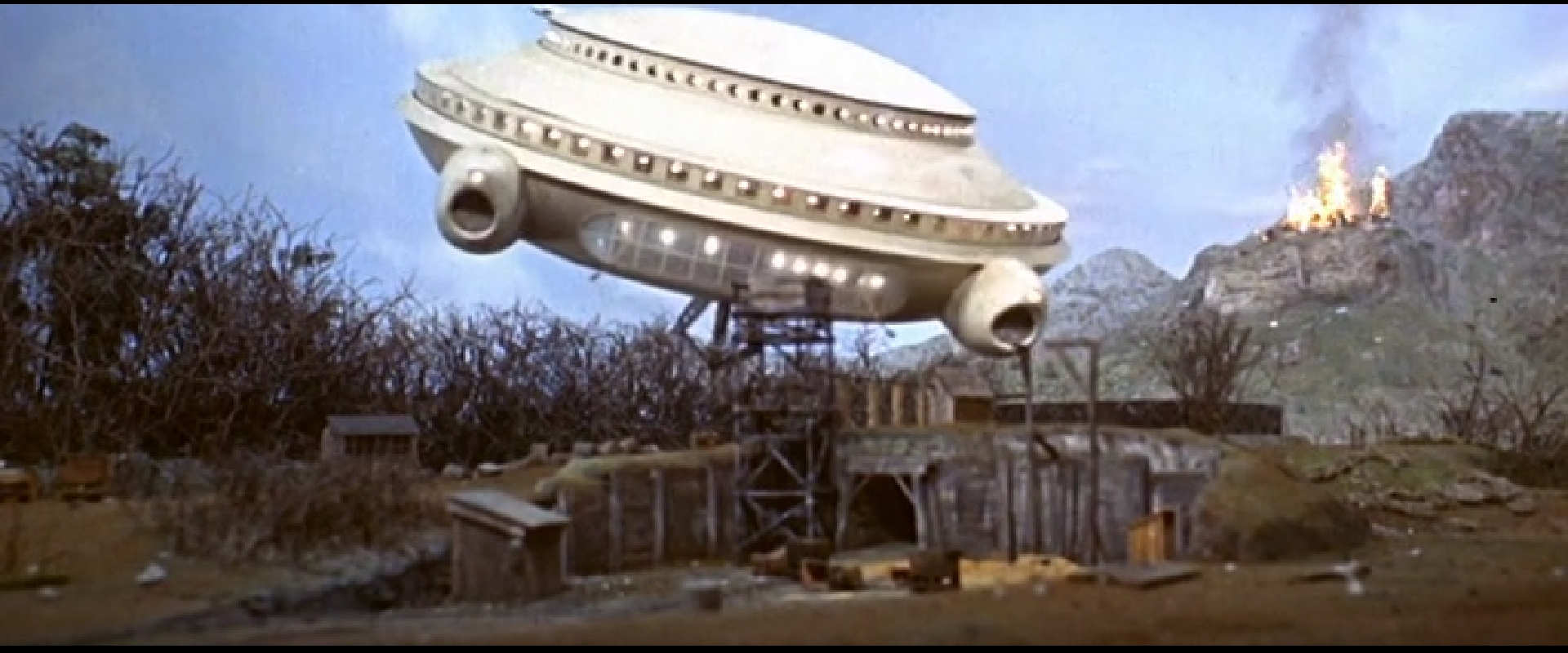
By Jessica Holmes
We’re between series of Doctor Who on the television, but you aren’t escaping my rambles that easily. 'Dr. Who' is back on the big screen, so I ventured to the cinema to see if Daleks’ Invasion Earth: 2150 AD is any good. Directed by Gordon Flemyng and written by Milton Subotsky, this film is a follow-up to last year’s Dr. Who And The Daleks. Like the first film, this is also based on a Doctor Who serial, that being The Dalek Invasion of Earth.

To spare us all a lot of waffling, I’ll skip the play-by-play rundown. In broad strokes, it’s the same story. Dr. Who (Peter Cushing) in his Tardis goes to future London, finding it overrun by Daleks. He joins up with the human resistance, everyone goes to Bedford, the Daleks try to turn Earth into a spaceship by blowing up the core. Dr. Who hatches a plan to stop them doing that by deflecting the bomb, then boom! A volcano blows up, Daleks all die, Earth is free, Bedford gets a new tourist attraction, yada yada yada.
The plot is almost identical to the original serial. I did think for a moment about just copying my previous article and changing a few names, but it does have a few differences.
The Black Dalek no longer makes an appearance in the story, and nor does its pet, the slightly rubbish Slyther, but I didn’t particularly miss them. Most of the rebels have been condensed into one single character, Wyler (Andrew Keir), and many smaller, less important scenes have been removed to streamline the plot.
Most significant among these differences is that with Susan in this continuity being much younger than her television counterpart (with Roberta Tovey reprising her role), there is no romantic subplot.

Instead of Ian and Barbara we have a bumbling policeman called Tom (Bernard Cribbins) and the Doctor’s niece Louise (Jill Curzon). They do not have personalities. You can look at the plot outline of the original serial, scribble out each instance of ‘Ian’ and replace it with ‘Tom’, then do the same for Barbara/Louise, and you’ll get an impression of the impact these character changes have on the plot.
Actually, now I come to think of it, you also have to replace all of the cool things Barbara does in the original (like running over a Dalek with a truck) with blank space, and give all those cool deeds to whichever male character happens to be nearby at the time.

I think it would have strengthened the emotional core of the story to give Louise the romance plot (though I would also have issues with her only being in the plot for the purposes of providing a love interest). At least it would have given her something to do instead of being shunted about from one location to another in a state of total passivity. In the original, the romance subplot was a major component of giving the story emotional depth.
This film, however, is empty.
The characters might as well be cardboard cutouts, and though the film follows the plot of the serial, it’s devoid of the sense of horror and despair that the original had. In the original, it felt very much that the resistance was fighting a losing battle, one grounded in reality. They were tired, they had very little hope left.
Here? It’s all just set dressing. With characters so flat they vanish if you look at them sideways, I just don’t care what happens to them. Nobody forms any real bonds, so there’s no sense that anyone has anything personally to lose. None of the deaths land with an impact. I don’t feel like the characters care all that much, so why should I? The Daleks might as well just kill them all.

The Daleks don’t even feel particularly Nazi-like as they did before. In the original, the resemblance was strong enough that it made the Daleks feel grounded in reality, and that much more threatening. This film feels a lot more light-hearted, so I suppose there is the silver lining that the plot to turn the planet into a (groan) spaceship doesn’t feel quite as silly compared to the rest of the story.
It’s just really hard to find things all that grim when every fight scene is accompanied by jaunty jazz numbers. There are some attempts at comedy, mostly revolving around Tom, particularly when he’s hiding on the Dalek ship. It might make a child laugh, but I wouldn’t count on it.

The acting is decent enough, nothing glaringly bad, but nothing great either. Cushing is entirely wasted, having been given no real chance to show Dr. Who’s character. He exists purely to poke the plot with a stick from time to time to keep it moving. It’s all quite mechanical. Everyone’s competent, but nobody feels like a real person. In streamlining the plot, the writer has jettisoned a lot of scenes that gave the characters room to breathe.
In the end, there’s a load of pointlessly complicated nonsense about deflecting the core-destroying bomb to make a big explosion of magnetic energy that will pull the Daleks into Earth’s core. Apparently the confluence between the north and south magnetic poles is under Bedford. I am not going to even bother picking that apart. It makes no material difference. Honestly, I think it just confuses things. Stick with the volcano!
Still, it’s quite funny when the Daleks go flying through walls like something off Looney Tunes. I’ll give it that.

With all this being said, would you believe me if I told you it’s better than Dr. Who And The Daleks? It’s perfectly watchable, if you’re looking for something to do for a little over an hour and have a handful of shillings to spare. I think kids would probably enjoy the adventure. There are plenty of exciting bits such as the chase out of London, and the art team did a great job on the special effects. I particularly liked the Daleks’ flying saucer, which is a wonderful model with moving parts. The eruption at the end isn’t bad, either.
So, what’s the verdict? Well, I wouldn’t rush back to the cinema to watch it again, but I don’t consider my afternoon entirely wasted. It’s a relatively decent but unremarkable science fiction adventure that in my opinion could have been so much more.
2.5 out of 5 stars


I saw this today and I am pretty much in agreement. As a forgettable SF film you could do a lot worse for 90 minutes of entertainment. However, compared to the original TV serial it is incredibly disappointing. The only thing it really has going is it looks a lot better (whilst the first film looked like they had just used the same stage). Tom also is at least less annoying than the Ian stand in in the first movie. Otherwise just a heavily diluted retread.
I don't know if you heard but it was recently announced Hartnell will be leaving the TV role and they are casting for replacements. Some people have suggested Cushing might get it. What do you think about that? Obviously he hasn't been given much room to show what he can do in these films but I think the series might allow him to properly step into Hartnell's shoes.
_I think the series might allow him to properly step into Hartnell’s shoes._
While I've seen Cushing turn up elsewhere on TV recently, — specifically, in one of the 'cybernaut' episodes of _The Avengers_, facing off against Patrick Macnee and Diana Rigg — I don't think he has the time to take off from his better-paying film work to do a TV series.
Indeed, I'm not sure Cushing would even _want_ to play Doctor Who on television, what with the visibly low budgets and tremendously inconsistent scripts.
Speaking of _The Avengers_, the current season and the last aren't just firmly in the spy-fi mode with cybernaut killer robots, but sometimes outright science-fictional. In the episode, 'The Man-Eater of Surrey Green," for instance, a giant extraterrestrial plant falls to earth in the English countryside, and proceeds to control the minds of the humans there and then eat them.
https://www.imdb.com/title/tt0516863/
Seems like grist for the Galactic Journey review mill!
You volunteering?
One of the (good) problems right now is there is so much SFF on British TV. In the last 12 months we had:
Doctor Who
The Avengers
Thunderbirds
Out of the Unknown
Adam Adamant Lives!
Mystery and Imagination
The Liars
The Master
Object Z Returns
Ape and Essence
The Devil's Eggshell
The Girl Who Loved Robots
1984
The War Game (although moved to cinema)
Legend of Death
And adding to them soon are:
Days To Come
Alice In Wonderland
The Corridor People
The Forgotten Door
We could easily just turn this into a British telefantasy fanzine without reducing the output